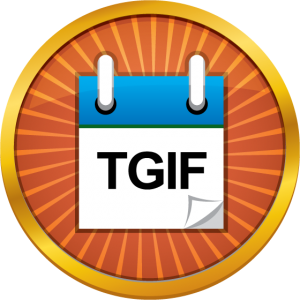T.G.I.F – The Practice of Personal Productivity
09 Dec 2011Thank goodness it is Friday. Over the last two weeks I have missed a number of outcomes, have a below average velocity, and added more tasks to my backlog than I have removed. Is it time to give up?

Absolutely not. It is time to review why.
What is the Weekly Review?
At the end of my week, I spend roughly twenty to thirty minutes reviewing my week. During the weekly review, I view my dashboard to remember what went well, what needs improvement, and determine what I am going to do differently next week. As time permits, I look for opportunities to save missed outcomes by taking steps to correct what went wrong and get set for success next week.
As described in the overview, I follow these steps:
The Weekly Review
- Review lessons learned from daily tasks and weekly outcomes – I make sure I have captured lessons learned from any uncompleted tasks or outcomes and look for trends across weeks.
- Analyze metrics – Since I am capturing my backlog, daily tasks and status, weekly outcomes and status in a spreadsheet, I am automatically capturing metrics through a set of pivot tables to help me understand how I am doing. For example, I capture my backlog management index, my weekly outcome % complete (this week, last week, total), my daily task % complete (this week, last week, total), my velocity (# outcomes per week or tasks per day), unplanned work, and my power days.
- Capture what went went well for week – I find it important to remember what went well so I can repeat it next week.
- Capture what needs to improve for week – I seek to improve in my ability to complete items as well as make any process tweaks to increase my capacity / eliminate waste.
- Review backlog – I review my backlog, mark completed items, and remove items no longer relevant.
Why the Weekly Review works
- Measurement – I imagine that tracking lessons learned, dates, and completed tasks seem like overkill for many. However, keeping accurate data and analyzing the data is key to gain new insight and is the basis for meaningful change.
- Continual Improvement – The weekly review enables continual improvement. By reviewing your week and missed outcomes, you can seek to eliminate wasted time and energy. In addition, you can make adjustments so that further deviation from your goals does not occur.
- Meeting Expectations – During the weekly review, you can better understand your capacity and productivity for a given week. This insight will enable you to set better expectations for others.
- Responsibility – The weekly review will help you acknowledge and accept the choices/actions you have made throughout the week as well as the corresponding results – the basis of taking responsibility. When I have a “bad” week, taking responsibility enables me to move from helplessness to empowerment. Remember to avoid blaming others in your lessons learned and word them in a manner that recognizes your part in the missed outcome/tasks.
Question for you: Is the weekly review too frequent to have meaning for you?